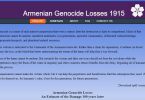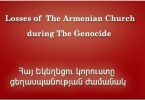Prepared Remarks
Tom Samuelian, Massachusetts State House, April 15, 2011
| But this must be resolved before it creates greater catastrophes. Toying with a heavily militarized Turkey is playing with a radioactive fireball. It may give diplomats a thrill to ride the tiger, but sooner or later the tiger will bite back and lash out, unfortunately, not only at those who provoked it, but also at bystanders. |
When I was asked to give this talk today, I was at first somewhat reluctant to accept. It seems that everything that can be said about the Armenian Genocide has been said. Yet Armenians, Turks and other members of the community of nations, including the United States, still cannot seem to stop talking about it. So I decided to talk about why.
One reason people talk, is because they don’t know what to do. That the Armenian Genocide happened is not really in question. President Obama said as much during his historic visit to Turkey. In fact, all US Presidents have condemned it. Turkish oppression and mistreatment of the Armenians has been on the US foreign policy agenda since the late 19th century.
As eyewitnesses to the crime, the United States and many countries in Europe have all the evidence they need, beyond a reasonable doubt. Some, impelled by the evidence, have drawn the legal consequences that flow from that evidence. They condemn it as Genocide and make Turkey’s redemption a condition of admission into the EU. Sometimes, as in the case of Germany, they are compelled to draw the legal consequences just to live with themselves, because of their own complicity. Others, like the US, UK and Israel, balk at drawing legal consequences for fear of retaliation by their unrepentant Turkish allies.
We live in a world where not all facts have legal consequences. Many have only political consequences, and political consequences are in the eye of the beholder. To date, the Armenian Genocide has languished as a political fact, and Turkey and the US, have struggled mightily to keep it out of any legal process, since it gives wiggle room to do as they please. This is why the Armenian Genocide is condemned by political bodies, such as legislatures, through political processes, such as resolutions and proclamations.
Where legal processes require oaths to tell the truth or compel closure, political processes are open ended. They are free-for-alls, where it is not only acceptable, but expected, that the players will bait and switch, dodge, snow, and wring their hands. What in a legal process would be perjury, obstruction of justice, or acting as an accomplice after the fact, evokes little more than a slap on the wrist or a wink and a nod.
The court of public opinion is a large, interminable brawl room where the truth is among the least important factors. Distraction and confusion are highly effective tactics, as amply shown by the history of tobacco or the global warming coverup. All it takes is creating controversy – enough reasonable doubt so that reasonable people have an excuse to avoid making a decision or taking action. Since there is no closure in the court of public opinion, the talk keeps going.
Add to this that the media behave like a jammed accelerator pedal, fueling the appearance of controversy by artificially shoehorning any situation into a supposedly fair and balanced, one-size-fits all news template. Little wonder, the perpetrators have avoided closure, finding obfuscation the better option.
And little wonder the world can’t stop talking about it. Talking about it is the only way to assure that nothing is done about it. It postpones definitive action in the hope that it may just go away by itself. There are at least two versions of this in the air. One is that the Turks are many and strong and the Armenians are few and weak, so it is a war of attrition and the Turks will outlast the Armenians. The other is that the Turks and Armenians will be shamed or bullied into kissing and making up, because cross-border bickering on the outskirts of Europe is unseemly.
Both fail to address the real reason the world can’t stop talking about the Armenian Genocide: The Armenian Genocide is not an Armenian or a Turkish issue. It is a community of nation’s issue. It is about community norms that have been violated. And even if, for whatever reason on whatever terms, the perpetrators and victims reconcile, the crime against humanity remains to be addressed. This is not a commercial dispute that can be put behind us, swept under the rug, or haggled away. Humanity was violated by the 20th -century Turkish destruction of the Armenians. Humanity was humiliated by its impotence to prevent it. The Turks lowered the bar on barbarity and the community of nations is still smarting from it.
Humanity has a guilty conscience for abetting the crime. Self-interested protests and half steps to “protect” the Armenians provoked Turkish hostility against the Armenians in the 19th-20th centuries. Some countries even sent advisers and financed the Turks’ final solution of the Armenian Question. Others were in such a frenzy to grab the loot after the crime they trampled the victims. Others continue to benefit from blackmailing the perpetrator to extract short-term gains for geopolitical purposes. In short, there are a lot of nations that have benefited from the Armenian Genocide and the delay in addressing it, not just Turkey.
The Armenian Genocide is not a tiff between neighbors. It is violation of community norms. Even if the Armenians and Turks could wish away their differences, the condemnation by scores of eyewitnesses and countries and international institutions will not vanish. Nor, even more importantly, will it stop haunting the Turks. Maureen Freely, Nobel Laureate Orhan Pamuk’s English translator, has poignantly written about the taboos that haunt the Turks. In her introduction to Hrant Dink’s lawyer, Fetiye Cetin’s memoir about her Armenian grandmother, Freely writes:
“When victorious generals sit down to dictate history, their greatest privilege is to choose what to leave out. ” The Turks are haunted by what might have been but for the Genocide – a large, independent Armenia with tens of millions of smart, hardworking, cosmopolitan, Christian Armenians, with sea coasts and ports, a crossroads of commerce and culture. To help them suppress this, they have created myths, which they enforce under penalty of law and propagate through their chauvinist textbooks in schools at home and public relations firms abroad. Freely continues:
[I]n 1927, when Kemal [Ataturk] sat down to write the official history of [modern Turkey’s] birth, [the Treaty of] Sevres still cast a long shadow. It was the future that might have been, had Europe and Anatolia’s Christian minorities had their way. It is through this prism that four generations of Turkish schoolchildren have been taught to view the catastrophes of the last years of the Ottoman Empire, when Anatolia was between one quarter and one third Christian. They are not told that the triumvirate then in charge of the empire wished to ‘Turkify’ Anatolia by reducing that population to a level that would render it politically insignificant. . .
She continues:
For the past eighty years, Turkey’s powerful army and state bureaucracies have guarded the official history with the greatest zeal. Its penal codes are laden with laws severely curbing free expression, ensuring that most Turks have had little or no access to any information that might challenge or complicate the official line.
She concludes. Very perceptive insights indeed.
When the criminal is an individual, death may give the perpetrator rest. But in a collective, state crime, guilt is a cancer that lingers and persists from generation to generation. Today, a nation of tens of millions lives in dread of being exposed. When will the rug be pulled out from under the good life, the good reputation, the good position that the perpetrators and their children enjoy at the expense of the victims? President Obama said in Ankara, “the truth will set us free.” The Armenian Genocide cannot be washed away except through the cleansing of truth and redemption. Turkey needs to redeem itself and to unburden itself of these taboos. It must earn back its honor and dignity by undoing its misdeed, by making amends to the community of nations and making the victims whole. The community of nations does Turkey no favors by aiding and abetting the cover up. By the same token, those who have the courage of their convictions and condemn the Armenian Genocide for what it is are deserving of commendation. There are in this hall today such champions of truth and reconciliation, who have defended the Genocide Curriculum in the MA Schools. Join me in honoring them.
Today I stand before you as an American and as an Armenian. I will now speak as an Armenian, a descendant of genocide victims and survivors, who has made my home and living in Armenia for the past 13 years. Until Armenians make clear what needs to be done, people will just keep talking. In this crisis-weary world, simply repeating a tale of woe and complaining about one’s plight will not produce results. That was perhaps the only option when the Armenians were a people with no state and no standing in the community of nations. That changed with Armenia’s independence. Armenians are in a different legal position compared to 20 years ago, when indeed, the court of public opinion was effectively the only accessible forum. Political and legal reality has changed, but our mentality has not yet caught up. The Armenian nation, those living in the diaspora and those living in Armenia, have not yet figured out how to pursue national goals in a coordinated, effective manner.
Armenians have to formulate our plight as a problem that can and must be solved. No one will solve this problem for us. Armenians need to show the world how to solve the problem. So far, we have not done that. There is no compelling consensus as to what the problem is or how it can be solved. Some say an apology is enough, others money, others land, others rights and respect. Yet the answer is not so elusive. The aim should be to make the victims whole through a process that at the same time allows the perpetrators and beneficiaries of the Armenian Genocide to redeem themselves before the community of nations. This will create a new baseline for a healthy, stable peace. Anything less will sow the seeds of future discord. The usual formula is “Reversible harm should be reversed. Irreversible harm should be compensated.” But having a solution is still not enough. There needs to be a process that compels the interested parties to reach legally binding, politically acceptable closure.
Armenians need to help Turks, Americans and others visualize and then implement such a process and solution. We have been stuck in plight mode for over a century. It is unrealistic to expect the community of nations to act out of principle, generosity of spirit or even self-interest, unless there is a real cost, currently due and payable for their delay. No cost, no benefit, no urgency. To some extent, the nuisance factor of the Armenian lobby is a cost, but has not been enough to tip the balance so far.
As we gather here today in the Massachusetts State House, I recall speaker George Keverian and his years of distinguished service in this chamber as an American public servant and I salute the other Armenian-Americans who have stepped forth into the arena of public service. Make no mistake, the reason we are here today is not because of special interests or the clout of an ethnic lobby, but because the Armenian Genocide is quintessentially and inescapably an American issue, and Armenian-Americans have expertise and knowledge to solve it. We are here as problem-solvers. We are here out of a sense of social responsibility and public service.
It’s not easy for the United States to exercise world leadership, but if a country takes that mantel, it also assumes the corresponding duties to the community of nations. This is a lesson and a value system that both my classmate Barack Obama and I learned, even took for granted, as law students at Harvard, and which he, disappointingly, seems to have forgotten.
To sum up, the United States and other countries have been toying with the Turkish psyche, not only to their own detriment, but also to the detriment of many other countries, including Armenia, whose olive branch was rejected due to the pathology induced in part by the opportunism of US diplomacy. Yes, Genocide Recognition will cause some heartburn in Ankara, and perhaps, some hotheads in Turkey may resort to retaliatory rhetoric and some vengeful acts. But this must be resolved before it creates greater catastrophes. Toying with a heavily militarized Turkey is playing with a radioactive fireball. It may give diplomats a thrill to ride the tiger, but sooner or later the tiger will bite back and lash out, unfortunately, not only at those who provoked it, but also at bystanders. The showdown in the waters off Gaza last year is a glimpse of what is at stake.
To act in the present and for the future, we need to sort out the past. Humans are narrative beings, who can and must transcend history, as Armenia’s President Serge Sargsyan courageously did with the Protocols. There are many questions Armenians cannot solve for themselves. There are also issues others cannot solve for Armenians. However, the Armenians can facilitate a resolution to the Armenian Genocide issue by speaking coherently, not continuing to fall prey to the divide and conquer ploys of Turkey, Europe and the US State Department, ploys which have repeatedly been used to the detriment of our national interest. We should insist on real closure through the 5 res: recognition, reparations, restitution, redemption, reconciliation.
It is time to transcend and heal the wounds of Genocide and the Cold War, the dispersion and fragmentation of the Armenian nation. Only we can do that for ourselves. That is the responsibility of this generation, including the state, church, political, social and cultural organizations, but most of all, courageous and creative leadership. Armenians must recognize the situation for what it is. We should use this time to refine our own position. That takes talking to one another, frankly, respectfully, realistically.
So my message is yes, we still need to talk about the Armenian Genocide. We also need to be prepared to act effectively when the conditions are right and, whenever possible, work to create those very conditions. After centuries of statelessness, we have a state that has standing to speak for the nation in international fora. To produce results will take a strong, well-respected state and a cohesive, committed nation that speak and act together effectively and decisively. Bearing witness, mourning, protesting, all have their place, but they are reactions. Reactive behavior is not enough. The time has passed for posing problems to the world and waiting for the world to solve them for us. Armenians need to be proactive and solve the Armenian Genocide problem for ourselves and for the world.






